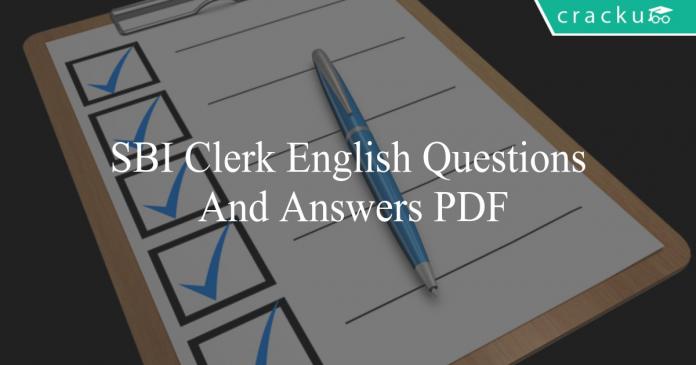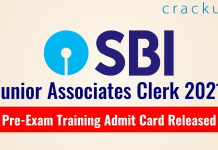SBI Clerk English Questions And Answers PDF
Download SBI Clerk English Questions & Answers PDF for SBI Clerk Prelims and Mains exam. Very Important SBI Clerk English questions on with solutions.
Download SBI Clerk English Questions And Answers PDF
490 Banking mocks for Rs. 299 – Enroll here
Instructions
By actual count, the __(1)__ struck at my establishment seven hundred and sixty-four times in forty minutes, but __(2)__ on one of those faithful rods every time, and __(3)__ down the spiral-twist and shot into the earth before it probably had time to be __(4)__ at the way the thing was done. And through all that bombardment only one patch of slates was ripped up, and that was because, for a single instant, the rods in the __(5)__ were transporting all the lightning they could possibly accommodate.
Question 1: __(5)__
a) vicinity
b) time
c) moment
d) past
e) crevice
Question 2: __(4)__
a) complacent
b) surprised
c) stubborn
d) determined
e) intrepid
Question 3: __(3)__
a) cornered
b) shut
c) slim
d) slid
e) shoot
Instructions
Select the phrase from the given options that can be used to connect the two sentences given below into a single sentence, implying the same meaning as the original sentences:
Question 4: Most students failed in the exam. The teacher set a tough question paper.
(i) Since the teacher had set a tough question paper,
(ii) Most students failed in the exam because …
(iii) Though the teacher had set a tough question paper, ..
a) Only (i)
b) Only (ii)
c) Only (iii)
d) Both (i) and (ii)
e) Both (ii) and (iii)
Download SBI Clerk Previous Papers PDF
Take a free mock test for SBI Clerk
Question 5: Preetha belonged to an influential family. Preetha decided to compete on an equal footing with others.
(i) Since Preetha is from an influential family,…
(ii) Though Preetha is from an influential family,…
(iii) Preetha decided to compete on an equal footing with others despite being….
a) Only (i)
b) Only (ii)
c) Only (iii)
d) Both (i) and (ii)
e) Both (ii) and (iii)
Question 6: Rakesh decided to undertake the project. Rakesh could not complete the project on time.
(i) Rakesh decided to undertake the project but …
(ii) Though Rakesh could not complete the project on time,
(iii) Despite not completing the project on time,
a) Only (i)
b) Only (ii)
c) Only (iii)
d) Both (i) and (ii)
e) Both (ii) and (iii)
Instructions
The Following questions have two blanks, each blank indicating that something has been omitted. Choose the set of words for each blank that best fits the meaning of the sentence as a whole.
Question 7: The best _______ of action was to travel using a ______ of all the modes of transport to save time and money.
a) coarse, culmination
b) bet, group
c) thought, combine
d) area, best
e) course, combination
Question 8: After being chosen best in his class, he _______ decided not to engage in any behavior that might make him look _____.
a) deliberately, smug
b) decidedly, superior
c) thoughtfully, hopeless
d) correctly, boasted
e) thought, spoilt
Instructions
In each of the questions given below, a paragraph is given which has some blanks and those blanks have to be filled with the same word out of five words given below it. You have to choose that same word as your answer and fill up the blanks with that appropriate word.
Question 9: Given the amount of ______ needed to go forward, it seemed unlikely that the team would do it. The ________ about the time needed left the team in a state of standstill. Had the new _______ about the objective not come, no one would have done anything.
a) conclusion
b) inference
c) report
d) information
e) analyzed
Banking Study Material – 18000 Questions
Question 10: The _____ of the defendant about his whereabouts during the time in question were so outlandish that even the employees of the ______ department of the insurance company were surprised. However, after a long legal battle, the court ruled in favour of the defendant and his ______ were found to be true.
a) narrative
b) stories
c) tale
d) myths
e) claims
Question 11: In the below question, a sentence or a part of the sentence is underlined. Below are given alternatives to the underlined part which may improve the sentence.
Pritam always smoked cigarettes.
a) had always smoked
b) was always smoking
c) had been always smoking
d) always smoking
e) No correction required
Question 12: In the below question, a sentence or a part of the sentence is underlined. Below are given alternatives to the underlined part which may improve the sentence.
One should always tread the path he has chosen.
a) one has chosen
b) he/she has chosen
c) that has been chosen
d) he chose
e) No correction required
Question 13: In the following questions, a sentence or a part of a sentence is underlined. Below are given alternatives to the underlined part which may improve the sentence.
The rooms and courtyards in which she had lived was strangely unfamiliar courtesy their elaborate decking in honor of the event.
a) was strangely unfamiliar with their elaborate decking
b) were strangely familiar in their elaborate decking
c) was strange and unfamiliar due to their elaborate decks
d) were strangely unfamiliar with their elborate decking
e) no correction is required
Question 14: In the question given below three sentences are given which are jumbled. Find the correct sequence of these sentence so that they form a meaningful paragraph.
A. A real difficulty is that of fairly apportioning the labour of the community among its members.
B. Who is to judge how much cotton-spinning, or distributing goods from the stores, or brick-laying, or chimney-sweeping, is equivalent to so much plowing?
C. There are many kinds of work, and by what standard are they to be measured one against another?
a) ACB
b) ABC
c) CBA
d) BAC
e) BCA
Question 15: In the question given below three sentences are given which are jumbled. Find the correct sequence of these sentence so that they form a meaningful paragraph.
A. It is not so with the Distribution of Wealth.
B. There is nothing optional or arbitrary in them.
C. The laws and conditions of the Production of Wealth partake of the character of physical truths.
a) ACB
b) ABC
c) CBA
d) BAC
e) BCA
Instructions
Read the following passage and answer the questions that follow:
In all countries where democracy is in vogue today, people have been deceived into believing that there is no better system than political democracy. Political democracy has no doubt granted voting rights, but it has snatched away the right of economic equality. Consequently, there is gross economic disparity between the rich and the poor, immense inequality in people’s purchasing capacity, unemployment, chronic food shortages, poverty and insecurity in society.
The type of democracy prevalent in India is also political democracy, and it has proved to be a unique system of exploitation. The Indian constitution was created by three groups of exploiters: the British exploiters, the Indian imperialists and the ruling parties representing the Indian capitalists. All the provisions of the Indian constitution were framed keeping an eye on furthering the interests of these opportunists. Just to hood wink the masses, the people were granted the right of universal suffrage. Millions of Indians are poor, superstitious and illiterate, yet the exploiters, through such practices as making false promises, intimidation, gross abuse of administrative power and vote rigging, repeatedly win over the electorate. This is the farce of democracy. Once they form the government, they get ample opportunity to indulge in rampant corruption and political tyranny for five years. In the subsequent elections – whether on the provincial or state level – the same absurdity is repeated.
This type of political opportunism has been going on in India since Independence. For the last thirty-five years, the political parties have maintained that in order to attain economic parity with the industrially developed countries of Europe, India must follow the democratic system. To support this argument, they cite the examples of America and Great Britain or China and the Soviet Union. The political leaders urge the electorate to vote in their favor at election time so that the country’s starving masses can reap the benefits of a developed economy. But once the elections are over, the exploitation of the common people continues unabated in the garb of political democracy, and other areas of social life are completely neglected. Today millions of Indian citizens are being deprived of the minimum requirements of life and are struggling to procure adequate food, clothing, housing, education and medical treatment, while a handful of people are rolling in enormous wealth and luxury.
One of the most obvious defects of democracy is that voting is based upon universal suffrage. That is, the right to cast a vote depends on age. Once people reach a certain age, it is assumed that they have the requisite capacity to weigh the pros and cons of the issues in an election and select the best candidate. But there are many people above the voting age who have little or no interest in elections and are not conversant with social or economic issues. In many cases they vote for the party rather than the candidate, and are swayed by election propaganda or the false promises of politicians. Those who have not reached the voting age are often more capable of selecting the best candidate than those who are entitled to vote.
Whether or not a candidate gets elected usually depends upon party affiliation, political patronage and election expenditure. In some cases it also depends on antisocial practices. Throughout the world, money plays a dominant role in the electoral process, and in nearly all cases, only those who are rich and powerful can hope to secure elected office. In those cases where voting is not compulsory, often only a small percentage of the population participate in the electoral process.
The prerequisites for the success of democracy are morality, education and socio-economico-political consciousness. Leaders especially must be people of high moral character, otherwise the welfare of society will be jeopardized. But today in most democracies, people of dubious character and those with vested interests are elected to power. Even bandits and murderers stand for election and form the government.
Article Source: http://EzineArticles.com/8157789
Question 16: The following sentence might or might not contain some grammatical or contextual error. Select the sentence among the given options that should replace the following sentence in the passage.
In those cases where voting is not compulsory, often only a small percentage of the population participate in the electoral process.
a) In those cases where voting is not made compulsory, often only a small percentage of the population participate in the electoral process.
b) In those cases where voting is not compulsory, often only a small percentage of the population participates in the electoral process.
c) In those cases where voting has not been made compulsory, often only a small percentage of the population participate in the electoral process.
d) In that cases where voting is not made compulsory, often only a small percentage of the population participates in the electoral process.
e) No correction is required
Question 17: According to the author, all of the following factors play a predominant role in determining who gets elected to the office in a political democracy except
a) the budget of the election in which the candidate participates.
b) the clout that a candidate enjoys in his party.
c) the party to which the candidate belongs.
d) how deep-pocketed the person is.
e) the power that the person wields in political spheres.
Question 18: Based on the author’s tone in the line ‘Those who have not reached the voting age are often more capable of selecting the best candidate than those who are entitled to vote’, we can infer that the author is most likely to recommend
a) voting rights for children below the permissible age limit.
b) scrapping of universal adult franchise and instituting a dictatorship.
c) giving voting rights to select children who are capable of making rational choices.
d) allowing only people who are aware of their choices to vote.
e) doing away with the age restrictions that prevent children from voting.
Instructions
In the following questions two columns are given containing three sentences/phrases each. In the first column, sentences/phrases are A, B and C and in the second column, the sentences/phrases are D, E and F. A sentence/phrase from the first column may or may not connect with another sentence/phrase from the second column to make a grammatically and contextually correct sentence. Each question has five options, four of which display the sequence(s) in which the sentences/phrases can be joined to form a grammatically and contextually correct sentence. If none of the options given forms a correct sentence after combination, mark (e), i.e. “None of these” as your answer.
Question 19:

a) A-F
b) A-D
c) C-F
d) B-D
e) None of these
Instructions
In each of the following questions given below, a sentence is given with some bold words which may contain errors. Below each of the sentence, a table is given with two columns in which column ‘A’ contains the list of bold words, and in column ‘B’ the suggested corrections are listed. You have to choose the best alternate among the four given options. If no correction is required against the given bold words, mark (e) .i.e. “None of the above” as your answer.
Question 20: The event got cancel due to haphazard arrangements done by the incompetent event managers from the reputable company.

a) (1) – (5) and (4) – (8)
b) (2) – (6)
c) (3) – (7)
d) (4) – (8)
e) None of the above
General Knowledge Questions & Answers PDF
Answers & Solutions:
1) Answer (A)
Among the given options ‘vicinity’ which means surrounding area completes the sentence meaningfully. Hence, option A.
2) Answer (B)
‘complacent’ means self-satisfied. ‘stubborn’ means ‘adamant’. ‘intrepid’ means ‘fearless’. Clearly, option b fits best. Hence, option B is the correct choice.
3) Answer (D)
Option d is the best substitution here as rest of the options does not form meaningful sentences. Hence, D.
4) Answer (D)
The teacher had set a tough question paper. As a result, most students failed in the exam.
(i) and (ii) try to provide a reason for most students failing the exam. (iii) tries to present a counter-intuitive statement. Therefore, we can eliminate (iii).
Both (i) and (ii) can be used to start the sentence and hence, option D is the right answer.
5) Answer (E)
Preetha is from an influential family but she decided to compete on an equal footing. She did not use her privilege.
(i) tries to present being from an influential family as the reason. We can eliminate (i).
Both (ii) and (iii) can be used to begin the sentence and hence, option E is the right answer.
6) Answer (A)
Rakesh decided to undertake the project but he could not complete the project on time.
There is no cause-effect relationship between deciding to undertake the project and not completing the project on time. Therefore, we can eliminate (ii) and (iii).
Only (i) can be used to start the sentence and hence, option A is the right answer.
7) Answer (E)
Option A is incorrect because the first word does not fit logically. Option B is incorrect because the first word is illogical in the context. Option C is incorrect because the first word does not make any sense in the first blank. Option D is incorrect because both the words are logically senseless. Option D is correct grammatically and logically. Thus option D is the correct option.
8) Answer (A)
Option A looks logically and grammatically correct. Option B is incorrect because the first word does not fit well grammatically. Option C is incorrect because the second word does not fit the context. Option D is incorrect because the second word does not fit grammatically. Option E is incorrect because the first word does not fit grammatically.
9) Answer (D)
Option A,B,C are incorrect as they do not fit the context in the first blank. Option D seems logically and grammatically correct. Option E is incorrect as it is incorrect grammatically.
10) Answer (E)
All the options other than option E are incorrect because they do not go in the context when placed in the second blank. Thus, option E is the correct answer.
11) Answer (B)
The given sentence has the word ‘always’ which indicates that the habit was a persistent one and continued. So, the past continuous form should be used. Hence, option B is correct.
12) Answer (A)
whenever we use the pronoun ‘one’, it has to be used throughout the sentence. So, in this sentence the usage of pronoun ‘he’ is wrong. It should be replaced with ‘one’. Hence, option A is the correct choice.
13) Answer (D)
The room appeared unfamiliar due to the decoration. ‘were’ should be used instead of ‘was’ since the sentence contains multiple subjects. Also, ‘decking’ should be used (to denote that the place has been decorated). Therefore, option D is the right answer.
14) Answer (A)
Statement A is the opening sentence as it introduces a difficulty. Statement C further elaborates on the difficulty and gives a reason for the same. Statement b exemplifies what has been mentioned in the previous sentence. Thus, the correct order is ACB.
Hence, option A is the correct answer.
15) Answer (C)
Statement C is the opening sentence which tells about the laws and conditions of the Production of Wealth. Statement B mentions additional opinion about the laws and conditions specified in the previous statement. Statement A states that the case discussed before is not the same with the Distribution of Wealth. Thus, the correct order is CBA.
Hence, option C is the correct answer.
16) Answer (B)
‘A small percentage of people’ is a singular subject. Therefore, ‘participates’ should have been used instead of ‘participate’ and hence, option B is the right answer.
17) Answer (A)
By the term ‘election expenditure’, the author is referring to the amount of money that the candidate can afford to spend. Just after mentioning the line, the author explains how money plays a crucial role in many elections. Therefore, the budget of the election does not influence the chances of a candidate and hence, option A is the right answer.
18) Answer (D)
The author does not use the line to emphasize that people below the age limit should be allowed to vote. He tries to highlight the fact that having age as the criterion to filter out voters is absurd. Therefore, the author wants to put a stricter mechanism in place that allows only people who can rationally select their choices to vote. The main argument of the author is not to lower the age bar, but to institute a better mechanism to decide who gets to exercise their vote. Therefore, option D is the right answer.
19) Answer (A)
The possible combinations are:
A-F: If you really want to make a compelling case then your arguments must be backed by hard facts.
C-E: My disbelieve in the existence of God makes me an agnostic and not an atheist.
Among the given options only A-F is present. Hence, option A.
20) Answer (A)
Option A is correct because both cancel and reputable are grammatically incorrect whereas there replacements are grammatically correct. Option B is incorrect because haphazard means more than just dangerous. It can mean mismanaged as well. Option C is incorrect because hard-working does not fit in this context. Option D is correct as reputable is grammatically correct but since there are 2 corrections, option A will be the correct option.
We hope this English Question & Answers PDF of SBI Clerk is very Useful for preparation of SBI Clerk Exams.





